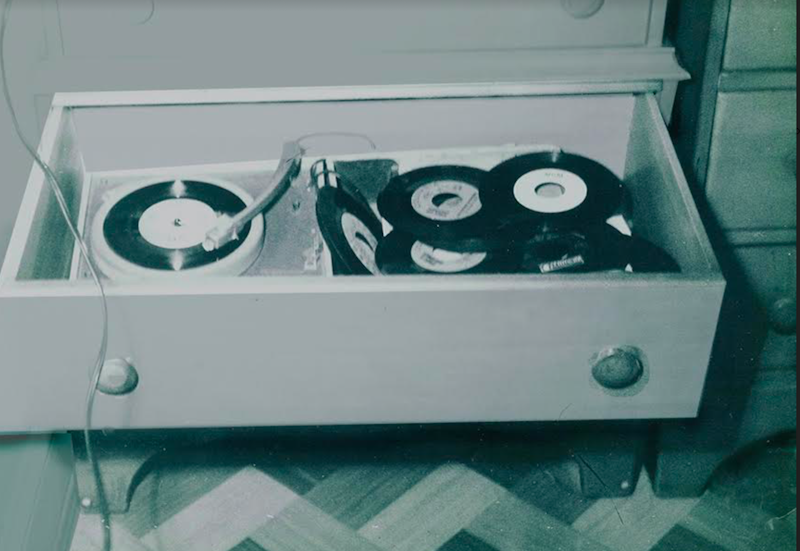My first sound system was a small AM/FM transistor radio I kept next to my bed during the 1960s. I’d scan the dial all night looking for stations. A collector’s worst nightmare was my overflowing chest of drawers filled with 45 rpm singles in a fluorescent blue, yellow and pink polka-dot painted bedroom. You read that right. The dark-pressed vinyl circles needed plastic adapters to fit the center hole in order to play. Interesting to note: the invention of the 45 was a Little Nipper brainstorm, the RCA-Victor canine representative who helped make microgrooves possible.
Whether you know a little or a lot about 1960s music, here’re a few thoughts: there were no formal guidelines or straightforward formulas other than disturb the status quo. Unprecedented creative growth swept the globe. Visionary artists crafted a fashion forward youth culture. Anti-establishment movements sparked by bohemianism, spurred New Age businesses under the guise of spiritualism. Today you can experience the soundtrack of yesterday, it’s available to stream online anytime.
Getting back to rock’n’roll:1966. Across the country teens picked instruments and formed CYO bands. In basements and garages, the perfect amateur hour, three-chord guitar fuzz was appreciated. The Sunset Strip and Haight-Ashbury saw the British Invasion. The Beatles butchered dolls for the Yesterday and Today record cover. Bob Dylan crashed his Triumph. The Count 5 had psychotic reactions. The Troggs rocked “Wild Thing.” Besides the music, something else was happening.
The Vietnam War waged on. Marines prepared napalm air strikes, as frightened women held children squatting in a mud hole south of Saigon. Watching it unfold on our black and white television sets or attending war protests, we witnessed nationwide signals calling for change.
If you were around then, you might remember the popular flip-up Zenith record players. In our house, we had a push-button Magnavox Hi-Fi stereo system tucked away in a wooden cabinet console. A moveable tonearm slid over the stack of 45s on the turntable’s stacking spindle. Each record descended successively, and slowly. Either automatically or manually, the needle contacted the record.
Distant heyday melodies from the 1950s through 1980s live on in our memories; in part due to the 45 single-dominated jukebox. By the 1970s, music merchants provided many other mainstream music options: 8-track tapes, boom boxes, cassettes, plus television and radio shows. For me, a golden listening era was the mid-1990s, when jukes became difficult to find. During this time period, the Riverrun in downtown New York City kept a vintage jukebox in working shape; I helped curate a 45 playlist with Russ Smith for the restaurant bar.
The Tribeca music machine’s home had barrel-vaulted ceilings, providing a museum quality, echo chamber listening experience. Case in point: as if you’re hearing it live, the guitar strum on “Runaway” by Del Shannon sends chills down the spine. Excuse me for a second while the best spaced-out keyboard solo ever recorded moves me to tears, and I have to blot them away. The gathering place was accentuated by observing patrons inserting coins. Shout-outs and requests frequently resulted in multiple plays of the same song. Now that’s what I call community interactivity.
Going back to the early-1960s, a powerhouse dance scene existed in the Northwest region. An emerging music pattern occurs, places like Boise, Idaho, Portland, Oregon and Tacoma, Washington. Whether that was kick-started by dense fog or activated by soil richer than Miracle-Gro; Alice’s tripped-out rock ‘n’ roll garden cultivated Jimi Hendrix, Paul Revere and the Raiders and The Sonics.
The Portland-based band The Kingsmen had a hit in 1963 with “Louie, Louie.” The stratospheric “duhn-duhn-duhn” is one the most covered songs in music history. Lead guitarist Mike Mitchell’s tremendous solo highlights a $36 dollar, second-take recording session, produced as a band audition tape for a cruise ship job. The hard-to-understand lyrics, naturally due to technical difficulties, left the song open to interpretation causing an FBI investigation. Deaf politicians possessed an inability to decipher lyrics, so they deemed the song obscene. The agency’s job to fight obscenity under Bobby Kennedy’s watch, took two long years trying to find dirty words with no conclusive results.
“Louie, Louie” inspiration sources include a nod to a 1961 version by Rockin Robin Roberts and the Wailers, a minor hit in the Northwest. But the smooth original was released in 1957 by Richard Berry and the Pharaohs. Berry had long music career starting in doo-wop groups, he backed up 17-year-old Etta James on “Roll with Me, Henry.” There’s even “Louie, Louie” Day: April 11th, songwriter’s Richard Perry’s birthday.
In 1964, we catch a glimpse of a ruddy, young Irishman with closed eyes, singing his heart out about a girl with sincerity and desire. “Gloria” was born with all the elements of an instantly recognizable rock staple, a timeless gem. Singer-songwriter Van Morrison’s song was initially a small B-side hit for the Belfast band Them, which took its name from a 1954 sci-fi monster movie. Two versions of “Gloria” appeared on the Billboard charts in May 1966: Them’s version, and the Chicago misfits’ band The Shadows of Knight’s newly minted interpretation; hence solidifying sainthood for “Gloria.” For a serious head bop, check out the Shadows’ underrated “Shake” the kind of thing mother warned you about.
By late 1982, CDs arrived. The 45 single market slid downhill into retirement, relegated to antique and flea market status. And the jukebox is now recognized as a classic symbol of old-school technology.

